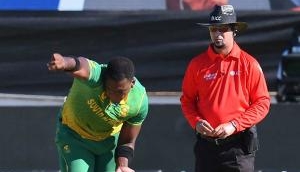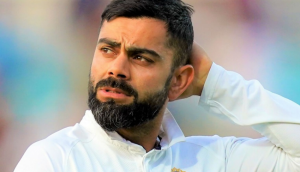The end is near for the BCCI's 87-year-old zamindari system

The resistance
- The BCCI has some objections to the Lodha Committee\'s recommendations for reform
- The Supreme Court is set to hear the matter on 3 March
The expected outcome
- The Lodha Committee was formed by the SC, and so, the apex court may not listen to the BCCI\'s objections
- With lawyer Shashank Manohar at the helm, BCCI is more malleable to change than before
It was always on the cards: the 'zamindars' of Indian cricket would not easily loosen their vice-like grip on the turf called the BCCI. After all, they have stoutly defended the body's structure, size and contours for 87 years now.
But, after the RM Lodha Committee's revolutionary recommendations, it seems that the world's wealthiest cricket body will finally undergo a change, sooner rather than later.
The reasons for this belief are quite a few, considering some recent events and the mood of the Supreme Court Bench that is handling the matter. The Bench has sufficiently indicated that it wants the entire Lodha Committee report on BCCI reforms implemented. The writing is on the wall, and the BCCI would do well to avoid antagonising the judges further.
After the Lodha Committee recommendations, it seems the BCCI will finally undergo a change soon
Don't make the judges angry
First and foremost: the Lodha Committee was appointed by a Supreme Court Bench headed by the now Chief Justice of India, TS Thakur. So, it's only natural that the recommendations of a committee constituted by one CJI and chaired by another former CJI are implemented.
The only thing that remains to be seen is how many recommendations the Bench allows to be diluted - if any.
Also read: Cornered BCCI makes another attempt to escape Lodha Committee recommendations
"If you have any difficulty in implementing it, we will have the Lodha Committee implement it for you," Justice Thakur had told the BCCI counsel at the last hearing.
That left the BCCI with no choice but to obey, though its mandarins protested "off the record", for fear of making the judges angry.
Also read: Lodha Report: great ways to clean the BCCI. And why one can't count on it
Soft corner for the judiciary
The other major reason is that the man who heads the BCCI is also from the legal fraternity. Shashank Manohar is a well-known lawyer and is the son of another renowned lawyer, VR Manohar. The senior Manohar was the Advocate General of Maharashtra when Sharad Pawar was chief minister. Pawar is currently president of the Mumbai Cricket Association, and is said to be supporting Manohar on quite a few of the Lodha Committee's suggestions.
So, it is only natural that Manohar would have a soft corner for his fraternity and, as the head of the BCCI for a limited period, he would not like to annoy the judges/Supreme Court. He has, in fact, shown that he is ready to implement the recommendations, through several changes that he has effected since he took over the reins in October.
A day before he took charge on his terms, in an emergency caused by the death of Jagmohan Dalmiya, Manohar had met Lodha and was given hints at the changes the committee was going to propose. Within days, the winds of change had started blowing within the BCCI, as Manohar got the Board constitution uploaded on its website for the first time ever.
BCCI chief Shashank Manohar is a respected lawyer, and has a soft corner for the judiciary
He also started disclosing, on a monthly basis, details of payments of Rs 25 lakh and above made by the BCCI to various parties.
Then, at the working committee and a special general body meetings on 19 February, Manohar again showed whose writ runs in the Board at the moment. The gathering authorised him (along with BCCI secretary Anurag Thakur) to take the Board's and state associations' objections to the Lodha Committee's recommendations to the Supreme Court. The court hears the matter on 3 March.
The Centre's silence
There is another factor that can't be missed in this saga, though it is not directly related to cricket. The Central government, despite many of its prominent politicians and MPs being part of the BCCI, has maintained studied silence over the first as well as the second Lodha Committee report.
One can argue that the silence was due to obvious reasons - the order had come from the top court of the country, so criticising it in public could have invited reprimand or more. But the other reason could be that perhaps even the government has to come to accept the fact that a reform of the BCCI was now inevitable.
Perhaps the Central government has to come to accept the fact that BCCI reform is now inevitable
Things became apparent when the first Lodha Committee report on the IPL betting and spot-fixing scandal was released in July last year, and the Supreme Court ordered implementation of the recommendations enshrined in that.
Also read: BCCI to approach Supreme Court challenging Lodha Committee recommendations
Accordingly, the Chennai Super Kings and the Rajasthan Royals IPL teams were suspended for two years, and Gurunath Meiyappan of CSK and Rajasthan Royals' co-owner Raj Kundra were barred for life from involvement in any type of cricket activities.
It was obvious that the second report could only make things worse, from the BCCI's perspective.
True to expectations, the second report was more hard-hitting than the first one, considering the ramifications it would have on the BCCI's immediate future and alsothe long run. It was a potential game changer.
Also read: Act on Justice Lodha Committee's recommendations, Supreme Court tells BCCI
Former CBI joint director Ravi Sawani, who investigated the 2013 IPL betting-spot-fixing case for the BCCI before the Supreme Court appointed the Mukul Mudgal Committee for another thorough probe, said it was time changes were effected in the BCCI.
"Definitely, the BCCI needs a complete change. No doubt," Sawani, the founding director of the BCCI's Anti-Corruption Unit, told this reporter.
Resistance expected
The final word in the BCCI saga is yet to be said, chiefly because its administrators will not relinquish their monopoly so easily.
Officials of the associations that the Lodha Committee Report has suggested for demotion will particularly be seething, if the Supreme Court insists on the implementation of 'one state-one vote'.
If that suggestion is implemented in its entirety, full member associations like Saurashtra, Baroda, Vidarbha, Indian Railways, Association of Indian Universities, and the Services Sports Control Board would be dealt a severe blow, as they would then be automatically made associate members.
All in all, a lot of action could still be left. An indication of which direction the story is headed will be available on 3 March when the Supreme Court hears - and possibly decides once and for all - the objections that the BCCI and its affiliated associations have over the some game-changing recommendations of the Lodha Committee. Till then, everyone will have their fingers crossed.
Edited by Shreyas Sharma
More in Catch:
Mumbai Cricket Association to move SC on Lodha panel recommendations
Justice Lodha is right. Betting must be legalised
First published: 22 February 2016, 9:59 IST





![BJP's Kapil Mishra recreates Shankar Mahadevan’s ‘Breathless’ song to highlight Delhi pollution [WATCH] BJP's Kapil Mishra recreates Shankar Mahadevan’s ‘Breathless’ song to highlight Delhi pollution [WATCH]](https://images.catchnews.com/upload/2022/11/03/kapil-mishra_240884_300x172.png)

![Anupam Kher shares pictures of his toned body on 67th birthday [MUST SEE] Anupam Kher shares pictures of his toned body on 67th birthday [MUST SEE]](https://images.catchnews.com/upload/2022/03/07/Anupam_kher_231145_300x172.jpg)






